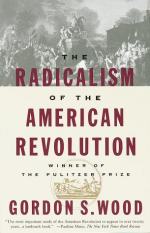|
This section contains 1,349 words (approx. 4 pages at 400 words per page) |

|
Part 2, Chapter 9 Summary and Analysis
By the early 1770s, society seems less ordained by God and more man-made and increasingly arbitrary. By adopting new enlightened standards of paternalism, rulers of all sorts are collaborating in the weakening of their authority. Unlike rulers elsewhere, English rulers cannot use compulsion, but must be liberal and enlightened to gain the natural affection and respect of dependents. In the colonies, these efforts are met with fear and resentment, and the refusal to meet traditional obligations.
In hindsight, John Adams identifies the source of revolution in the systematic dissolution of family authority. By 1750, few fathers dare deal with their households as arbitrarily as a century earlier. Married American women have more legal rights than their British counterparts, particularly in the initiation of divorce. Sons and daughters are leaving home more readily and demanding choice in potential spouses. Premarital pregnancy...
(read more from the Part 2, Chapter 9 Summary)
|
This section contains 1,349 words (approx. 4 pages at 400 words per page) |

|




